The runic alphabet is an old Germanic literary language, which were used in all of Northern Europe. In addition runes has always had a magic, prophetic meaning. Runemasters used them to practice magic on somebody, cure the ill, protect holy rituals and resurrect the dead. Runes also had an important role in making prophecies. From the very beginning each of the 24 runes in the alphabet had their own name. It is said that runes were also used to interpret omens from the gods, especially Odin. The legends the runemasters told, tied the runes to Odin. He appeared as a Shaman or a wandering wise man (even if he also was a warrior, lawgiver and lover of great capacity). He is described as wearing a cloak and a wide brimmed hat, one-eyed and with a blackthorn-staff. A legend about his life tells he spent 9 days and 9 nights in the tree of the universe, Yggdrasil, until he noticed some runestones on the ground. He reached for them in pain, grabbed them - and was released by the magic of the runes.
One believe that the runemasters made their runes themselves by carving them in a rock, wood or leather. Afterwards they coloured them with magical ingredients, which at times can have contained blood. If they were consulted about a coming event, they spread the runestones on the ground. Only the stones which landed with the runeside up were interpreted.
The original, magical symbolism tied to each rune, is lost. The following interpretations are based on astrology, numerology and I Ching. If it is hard to get hold of runestones, you can make your own from small stones or pieces of wood, which should be about the same size. Many specialists claim that the runes work best when they're made by the person who should use them. But remember: There's nothing magical about the rune-stones, they just connect you to your intuitive process in your "inner self."
Interpretation of the runes
(Old Scandinavian names are used.) 
fé - harmony, fertility
Connected with luck and the good things of life, especially with goods and gold - mainly cattle in the beginning. It has strong associations with Taurus in the Zodiac. Promise material goods, but warn against self indulgence and stagnation.
Fé encourage creativity, emphasize mutual love and promise completion.

úr - power, energy
Symbolise a wild ox with an enormous energy and power, which must be tamed before its strength can be used positively and constructive. Suggest that the asking person is entering a period characterized by changes, growth and consciousness. Adversity, even tension and stress, can create possibilities. Also a sign of sexual passion.
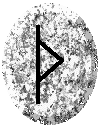
thurs - strength, good news
A request for an exhaustive evaluation of all situations - temporary neutrality and a pause for thinking, both in everyday life and psychic development. No matter what is achieved, we must be careful for a while. The rune is also called «The Gate»: We must pass through it, but first we should evaluate everything on this side. The gate can open to a confrotation with unknown dangers.
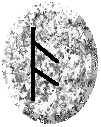
áss - Odin, wisdom
The rune of the written word and communication, connected with Mercury, which according to tradition communicated with divine powers. Also connected with Odin, who had to suffer great pain to become wise. Express wisdom and help from an elderly person. Better communication, possibly of magical or parapsychological nature, maybe with collegues. Be at guard against swindlers. Odin's day, Wednesday, is at the same day as Mercury's in roman languages.
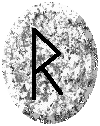
reið - wheel, travels
Long travels, traditionally by horse, especially funny travels. The travel can be spiritual (personal development) or the soul's last travel to Valhalla, home of the gods. Other interpretations: Message(s) sent or received, or scholarship the asking person need to gain.

kaun - creative fire, light
The rune of light and fire gives the asking person the ability to see the current situation in a brighter light. Lay stress on fertility and intensity, in addition to enthusiasm and optimism which clears the path and carry out ambitions.
Kaun has the planet Mars' flaming energy and strength. It is the rune-family's torch-carrier, but is also synonymous with passion and sexual lust, which can hinder personal development if they're stopped.

gebo - gifts, generousity
Gifts and the pleasure of giving. Friendship, generousity and simple delights. Even the rune of relationship/couples, and therefore a happy choice in connection with future engagement, marriage or businessprojects. Such relations demand a certain willingness to sacrifice, something that should not be underestimated: egoism can destroy all kinds of mutual experiences. Even a warning against laziness and indecision, but all in all in a positive rune.

wunjo - happiness, joy
A sign of happiness, strength and deliverance. The asking person is maybe frustrated by exaggerated self-criticism, but is encouraged to acknowledge and enjoy a well-earned change to the better. Also an ambiguous strain of sexuality: danger of disappointment even if it is laid stress on pleasure. It can cost to gain experience! Don't overlook the possibility of complications and difficulties.

hagall - trouble, misfortune
Suggest a frustrating and difficult period characterized by unexpected problems, misfortune or illness. Philosophical considerations concerning a problem must not lead to despair, and frustration not to rashness. Great possibility that coming changes will influence the future in long terms. Possibly inconvenience and fight, but extra effort will heighten the esteem.
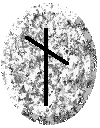
nauð - need, necessity
Need for patience is important. The asking person must judge his actions before he act, even the underlying motives. He can be his own, worst enemy. Greed or lust can easily be destructive. Emotional, material and spiritual wealth are close, but the angle of incidence must be soft, real soft. If we are dissatisfied with our share in life, possibly with a good reason, it's only
ourselves who can do anything about it.

íss - ice, cold
Frustrations andobstacles, and only patience can resist. A connection to the thought of ice and cold between humans, especially in the family. The asking person is maybe in a situation which prevents him from acting, or he may not be aware of what is going on. He should stay calm until the sun breaks through and the thaw comes. It can bring new emotions and perspectives.
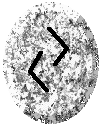

jara - year, natural cycle
The cycle of the seasons, especially the harvesting. When this rune is drawn og thrown, it refers to started work and encourage to perseverance and will to fight for success. Shortcuts will be catastrophic. The natural process - sowing, tending, ripening - must go its course. Let the patience rule physical and mental energy.
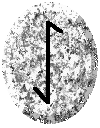
yr - yew, the journey of the dead
The yew was first of all Odin's tree. He collected the souls of the dead before the journey to the underworld. This rune symbolise therefore death, or changes and breaking with old habits. It doesn't have to be negative, but can signify htat the asking person is approaching his goal in a successful way (depending on the other runes.)
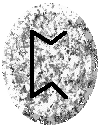
pertho - hearth, mysticism
One of the mysterious runes, which always has been a conflict over. It suggest something mystical, but refer also to home and hearth. A possible gift or heritage should be evaluated. Weight on secrecy, connections with the occult, possibly introduction to psychic activities.
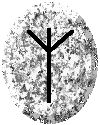
elgr - defence, protection
A very positive rune, which suggest that the asking person is strong and successful, but also experience a periode he should enjoy to the fullest. Possibly new and exciting challenges. It is important to let
elgr remind that emotions should be controlled, and that the current strength should be used positively. Be careful if you deal with people who exploit others, and don't put your health at risk.

sol - the sun, good health
Prosperity and luck. The asking person's natural abilities should come out and be used positively, so that they canreach their full potential. Success and creative will. Now and then
sol can ask if we don't have too many irons in the fire, and if we shouldn't slow down a bit. Also a warning against wanting to show off or over-dramatize, but encourage positive creativity.
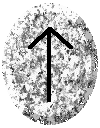
tyr - war, courage
Symbol of courage and devotion. At the same time the sun's mighty, masculine power appear together with passion which bring good fortune. Weight on patience, reminder of that some rules must be followed. Encourage to stand on your own feet and have faith in yourself. Positive actions and perseverance prompt respect.

bjarkan - birth, new beginning
A suggestion to fertility and to restoration/recovery. We must do penance for old sins and get rid of bad habits which are hazardous to health, such as alcohol and smoking. Women who are trying to conceive (the rune of birth) should be encouraged. If some plans promise bad, the whole matter should be reconsidered.

ehwass - horse, changes
The rune of Sleipner, Odin's horse - travel and changes. An asking person involved in a business project should be encouraged, but emotional relationships must be rebuilt or given some vitamins. Weight on spiritual travels. A calming rune which weights prosperity. To get inner peace we should make an extra effort to finish our tasks.

maðr - intelligence, culture
This rune represents the asking person and is strongly influenced by the surrounding runes. It represent the best in us - culture, memory, intelligence and other human traits. Our evaluations should be wide, our lives in balance and our emotions under control. The energy should be preserved and the body respected. Opinions and attitudes must be flexible and positive. «You've made your bed, now lie in it.» Remind the asking person of this in time of need. Everything is up to him!

logr - water, the unconscious
Connected with running water and consequently with emotions and intuition. We should get in touch with our intuition and our emotions, give them free reins (under supervision). Deepseated instincts shouldn't take the power from us. Psychic abilities and hidden creative abilities should be encouraged. Another subject is the change of one's self, with greater happiness as result.


ingwaz - fertility, completion
A fortunate rune which announce completion of a project or an idea, or someone who develop their potential to their fullest. At the same time a feeling of relief, which means an end to worries even if this need doesn't have anything to do with completion. A very important rune, often an omen of a turning point in the life of the asking person.

oðal - familyproperty
Beginning and end. Familytraditions and heritage, often in connection with breaking away from an old influence and maybe old friendship. Such changes have a long-lasting effect and will be important to the concerned. They can become difficult under the influence of
oðal, but doesn't lead to false steps. Related to
hagall.

dagaz - day, rousing
Dagnaz symbolize culmination and can symbolize spiritual advancement. Possibly a form of transition - at great benefit for the asking person. At it's best this rune establish that the darkness is over: light, results and prosperity are secured. This may seem fatalistic, but
dagnaz says that we must seize the opportunity, or else it will pass. Warning against indifference and encourage to a certain portion of meditation.

Odins rune - fate
This rune is completely blank and is said to represent both the end and the beginning, i.e. the transition of death (but not physical death of the asking person or others.) Possibly a symbol of something we don't know, a step into the unknown. Maybe personal development. A new phase in life or the whims of fate will be able to light the situation in the end.
To read the runes
Inverted runes
An inverted rune means that the actual influence is weakened, or that a negative indication is strengthened. |
The most useful way to lay the runes, may be the one shown here. The numbers indicates the sequence the runes should be placed.
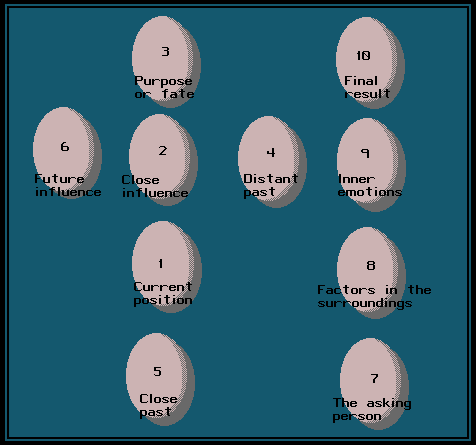































.jpg)


